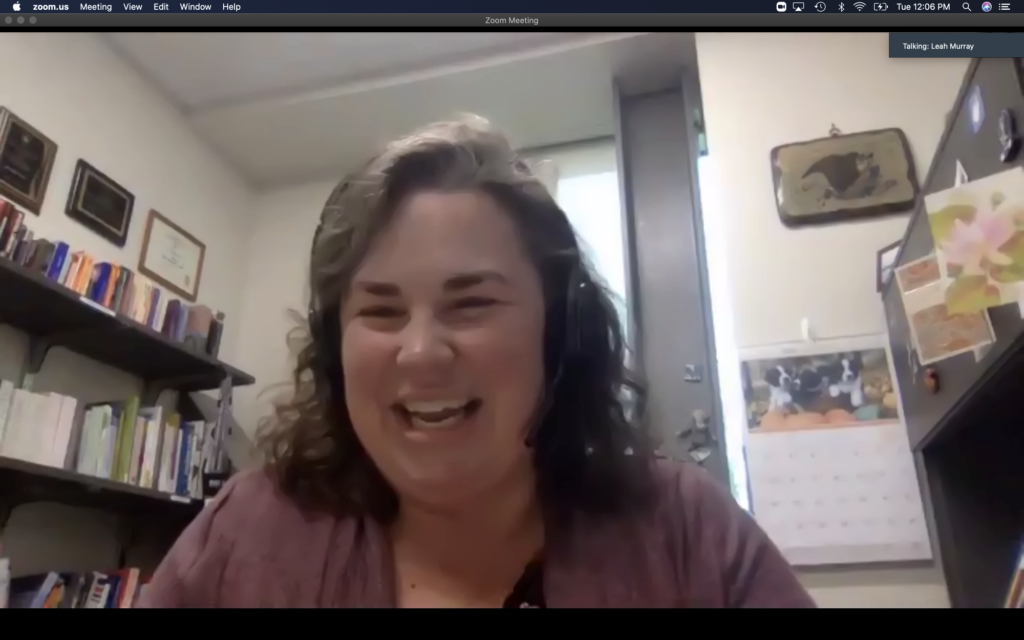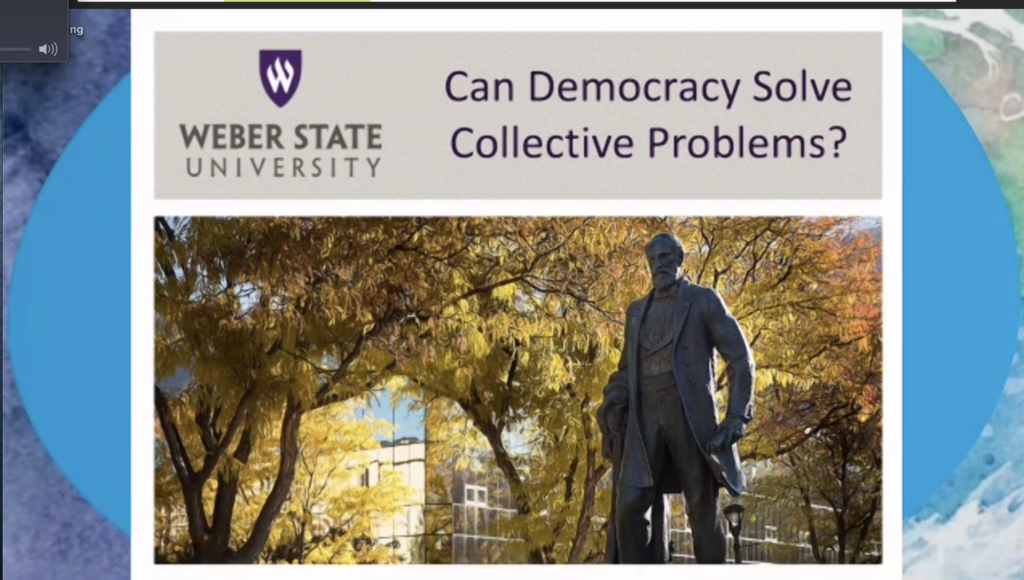Leah Murray, a professor of political science and the academic director for Olene S. Walker Institute of Politics and Public Service, led a conversation on collective action problems, climate change and democracy in the United States with students, community members and faculty and staff during Voter Education Week.

Murray was the guest speaker at Alice Mulder’s Climate Change and Culture Shift weekly course on Oct. 6 and discussed the Tragedy of the Commons to explain why we have a collective action problem in the U.S.

“The Tragedy of the Commons, basically, is the idea that it is rational for an individual to exploit the shared resources,” Murray said. “If we think about our kind of instinct, if you will, in our nature, our goal is to survive; our goal is to protect ourselves, our goal is to last, our goal is to reproduce so our DNA lasts.”
Murray said this is the kind of thinking that led to people hoarding toilet paper, Lysol wipes and other supplies at the beginning of the coronavirus pandemic.
“The tragedy is that what’s going to happen is, we exploit so much in our individual drive to protect ourselves that we don’t think about the collective good,” Murray said. “Individually, we misbehave, and it’s hard for us to rationally see that group effect.”
Murray said this is part of the collective action problem; it may be hard for an individual to focus on complicated issues such as climate change when the individual worries solely about him or herself.
“We’ve got built-in ‘individual rights really matter,’” Murray said. “We do not finely tune our sense of collective self, which makes dealing with the collective problems an issue.”
Adding to that, Murray said, many of our collective issues — such as climate change — are complicated problems.
“If you are figuring out why California is burning, and your answer is just forest management, you’ve missed completely what is going on there,” Murray said. “Forest management is probably a part of it, but there’s a whole list of issues that are there, so this is a collective, complicated issue.”
One of the ways a person can get information on complicated issues is through media, Murray said. However, the way that people are viewing media has changed because of the internet and social media.
According to the Pew Research Center, almost 90 percent of Americans get a portion of their news online, a trend that has grown across the center’s surveys over the last few years.
Pew Research Center also found that about two-thirds of Americans get at least some of their news from social media. Murray said that this doesn’t help with the collective action problem.
“So, I can’t think of things collectively, and now, I’m not getting any information that helps me figure these things out,” Murray said. “The places to go to get information are actually print media.”
Print media, Murray said, have the column space to address complicated issues and problems. However, Pew Research Center found that only around 15 percent of Americans are getting news from print newspapers.
Additionally, people who read the paper may not be getting all of the information they need to learn about climate change, one collective action problem.
Media and Climate Change Observatory found, when looking at the number of articles that appeared in The Los Angeles Times, The New York Times, USA Today, The Washington Post and The Wall Street Journal from month to month, that the five newspapers featured the most articles on the subject in September 2019. However, that total was only 800 articles.
However, that number is rising. According to Media and Climate Change Observatory, media coverage in the U.S. of global warming or climate change is showing up in papers more frequently each year.
Another part of the issue, according to Murray, is that since media has to compete with each other and for the attention of social media users, these outlets tend to focus on the stories that involve tragedy and not a conversation about climate change that everyone has heard before.
“If I haven’t spent the time in the media telling the stories about climate change, then all of us citizens in this democracy do not have the tools or the information to make us ready for that,” Murray said. “We are not capable of having that conversation.”
Despite all of this, there are still things we can do about climate change to fix the problem, Murray said.
One way is to join a political party, Murray said. Another is by engaging young voters.
According to Pew Research Center, almost 80 percent of Millennial and Gen Z Republicans prioritize developing alternative energy sources.
“This is a valence issue,” Murray said. “There’s not a partisan split on it; young voters really want to fix this.”
Murray said that young voters who are interested in getting leaders to prioritize climate change issues should attend a caucus. Another way is to donate money to interest groups.
“You have to do that,” Murray said. “Lobbyists influence how elected officials make decisions.”
Another method Murray recommended to address the collective action problem when it comes to climate change issues was protesting.
“Protests become successful when they seek broad goals that affect the entire society,” Murray said. “Climate change is an obvious one.”
Protests turn bystanders into people who take action, according to Murray. Protests also create pressure on the political system that forces the system to respond.
Murray said that people will need to do multiple things, including voting, to effect real change when it comes to climate issues.
“You’re registered to vote, and you make sure you vote, that’s the least you can do,” Murray said. “We have got to do all of this stuff.”
The deadline to register to vote in the Nov. 3 general election is Oct. 23 at 5 p.m. More information on registering to vote, checking your voter registration and learning about candidates and issues can be found at vote.utah.gov.



















